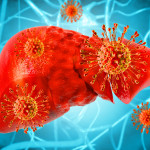Vertex Pharmaceutical’s experimental protease inhibitor for hepatitis C virus (HCV), telaprevir, was more effective when added to standard therapy than standard therapy alone, cuts treatment time from 12 to six months, and may help people who have failed approved treatments, according to several presentations reported by the National AIDS Treatment Advocacy Project (NATAP) from the recent 43rd annual meeting of the European Association for the Study of the Liver (EASL) in Milan. Though the studies were conducted in HCV-monoinfected patients—people infected with only HCV and not HIV—there is reason to hope that people infected with both viruses will also benefit from telaprevir.
Standard treatment for HCV is a combination of two drugs—pegylated interferon and ribavirin used for 12 months. These drugs have significant side effects and work less well against HCV types 1 and 4, the most common strains in the United States, and even less well in HIV-positive people with one of those two HCV strains. Sustained virologic response (SVR) rates—where a person’s HCV levels in blood remain undetectable for at least six months after stopping treatment—in people with HIV who have type 1 HCV are less than 30 percent.
In one of the more promising presentations to come out of the April EASL meeting, Vertex shared the results of their phase II clinical trial called PROVE 1, comparing four different treatment strategies in 270 patients with type 1 HCV infection. Those who added 12 weeks worth of telaprevir during the first 12 weeks of standard therapy were about a third more likely to achieve an SVR as people who just took standard treatment for 12 months. Even more exciting, when adding telaprevir for the first 12 weeks of treatment, it may be only necessary to continue with standard treatment for an additional 12 weeks—a total of six months of treatment.
The data that created the most stir at the conference, reports NATAP, were from the interim results of an open-label study involving people who tried and failed standard treatment. While it is possible to retreat patients with pegyalated interferon and ribavirin, success is usually less than 30 percent. For people who added telaprevir for 12 weeks, however, nearly all of the people who reached week 12 of the study had undetectable HCV levels—results considered to be predictive of treatment success.
Vertex has not yet announced when studies of telaprevir in people who are coinfected with both HIV and HCV will begin, but HCV activists say that the company is currently conducting studies of potential interactions between telaprevir and ARV drugs in anticipation of a coinfection study in the future.
Advertisement
Advertisement
Advertisement





Comments
Comments